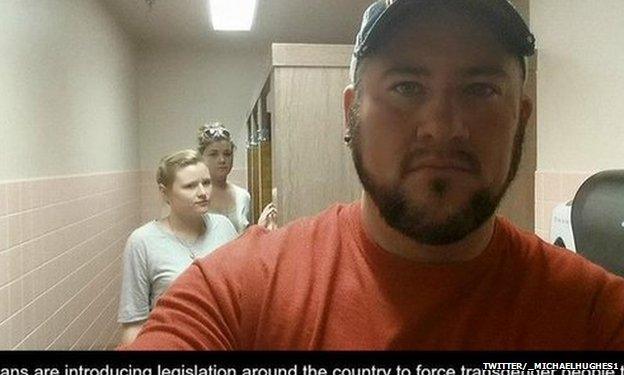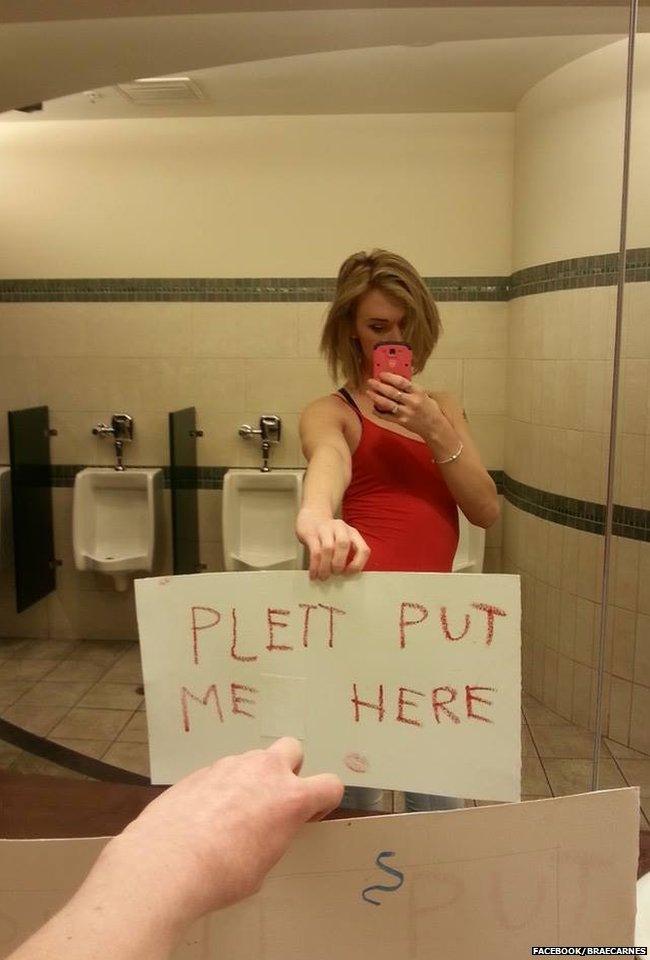'We just need to pee' transgender protest
- Published

Do you have to be biologically male to be allowed in the men's toilet, or biologically female for the ladies loos?
In several US states, as well as in Canada, the law governing public toilets is now a divisive issue. On one side are transgender people, who assert their right to use whichever loos they choose. On the other, conservatives who say a relaxation of the rules could leave members of the public vulnerable to traumatic or inappropriate situations, or even sexual harassment.
The latest twist online is an eye-catching protest tactic: the public toilet selfie.
Michael Hughes, a transgender man living in Rochester, Minnesota, is one of those using the tactic. On Twitter, he posts selfies with female friends standing behind him in women's public toilets. Hashtags like #weneedtopee and #occupotty (shared around 4,000 and 2,000 times each) have been created for the campaign.
"So I come in, go right to the mirror with a female friend behind me, and we quickly get the selfie, and get back out before anybody comes in and gets startled by my presence in the women's restroom," he told American television network KTTC. "I'm hoping that even the most conservative lawmakers and voters will be able to look at them, take a step back."
In Minnesota, as well as in Kentucky, the current proposed law would not affect all public restrooms but rather high schools, where restrictions have been proposed for toilets to be used according to a student's birth sex. In Florida and Texas, bills have been proposed to restrict all public facilities by biological sex.

The "we just need to pee" selfies have also started appearing in Canada, with transgender woman Brae Carnes as one of the main protesters. The legal situation there is slightly different: legislators initially voted to enshrine gender identity as a human right there, but an amendment was introduced by Canadian Conservative Senator Donald Plett that excludes "sex-specific" places such as public toilets. The law is yet to be finally passed. According to reports, his aim was to protect vulnerable people such as women who have experienced abuse from the trauma of sharing a space with anyone who is "biologically male.
Miss Carnes, 23, from Victoria, British Columbia, has posted selfies on Facebook of herself in men's toilets showing urinals in the background and uses the hashtag #PlettPutMeHere. In one of her photos she commented: "As a trans woman I'm not even safe from discrimination at the pub or public transit. What's going to happen if I'm forced into a men's changing room?"
Blog by Anisa Subedar
Next story: Islamic State go niche on social media
Or maybe you'd like to watch: Where is Putin?
You can follow BBC Trending on Twitter @BBCtrending, external, and find us on Facebook, external. All our stories are at bbc.com/trending.